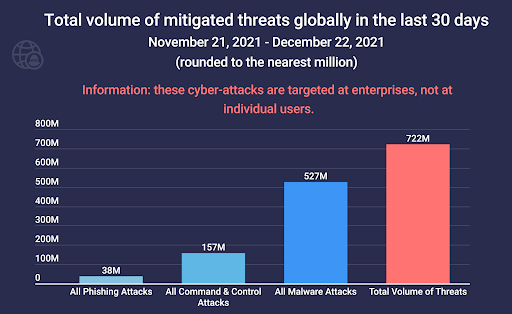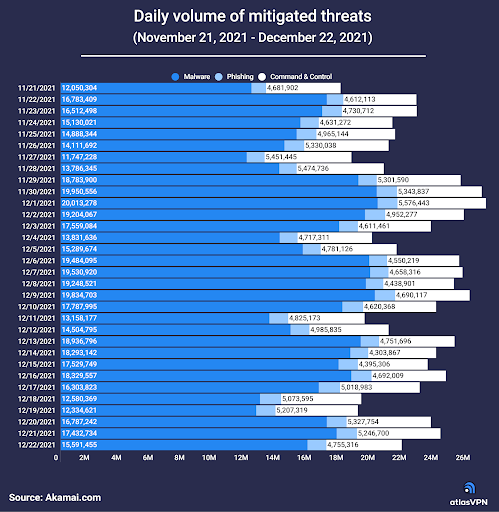Data compiled by Atlas VPN reveals that businesses were attacked over 700 million times across the world by hackers in the span of only 30 days.
Cybercrime has been increasing at a very steady, if not exponential, rate since the past decade or so. Honestly, it’s not difficult to see why; with so much of our personal information and data being stored online, conducting online espionage against any individual is almost always worth some amount of monetary gain in the process. With many businesses conducting their day to day tasks online, the rewards a cybercriminal reaps for even investing a few hours’ worth of energy are fulfilling enough to keep them going for a few days or weeks. Ultimately, cybercrime is a much easier modicum of crime than real life burglaries and robberies. They can be conducted remotely, require very little setup, and offer virtually the entire world up as targets. 700 million attacks are just a symptom of how many people live online double lives nowadays, and just how many of them are becoming more and more proficient at cybercrime by the second.
Atlas VPN, being a site that encourages online security and protecting your data from outside forms of threat is rather well-suited to conducting such a study, notwithstanding the fact that it’d also benefit from the additional self-promotion and PR. The data that they analyzed was provided by cybersecurity firm Akamai; a platform that itself is incredibly tailored to providing such data, since it currently provides security and real-time data to approximately 30% of all online traffic. Threats are divided by the firm into three separate categories. Of these, we’ve often covered phishing, since those are rather frequently encountered across the internet. However, surprisingly, Akamai’s data reveals that the most common attacks across the board are malware threats.
In the previous 30 days, over 722 million attacks have been reported by the cybersecurity firm. Of these, 73% were caused by malware, contributing 527 million to the numbers. With C&C adding 157 million attacks, we’re left with phishing attacks actually being the least frequent of all three, at 38 million. Which, mind you, is still an insanely high number, but it pales in front of the competition. Of the 30 days analyzed, between 21/11 to 22/12, the lowest frequency of attacks was encountered on the 21st of November. Even that number had over 12 million malware attack contributing to the overall threats, which paints a rather morbid picture of cybersecurity and online safety in the future.
Read next: Here’s How the NFT Ecosystem Has Started to Grow
Cybercrime has been increasing at a very steady, if not exponential, rate since the past decade or so. Honestly, it’s not difficult to see why; with so much of our personal information and data being stored online, conducting online espionage against any individual is almost always worth some amount of monetary gain in the process. With many businesses conducting their day to day tasks online, the rewards a cybercriminal reaps for even investing a few hours’ worth of energy are fulfilling enough to keep them going for a few days or weeks. Ultimately, cybercrime is a much easier modicum of crime than real life burglaries and robberies. They can be conducted remotely, require very little setup, and offer virtually the entire world up as targets. 700 million attacks are just a symptom of how many people live online double lives nowadays, and just how many of them are becoming more and more proficient at cybercrime by the second.
Atlas VPN, being a site that encourages online security and protecting your data from outside forms of threat is rather well-suited to conducting such a study, notwithstanding the fact that it’d also benefit from the additional self-promotion and PR. The data that they analyzed was provided by cybersecurity firm Akamai; a platform that itself is incredibly tailored to providing such data, since it currently provides security and real-time data to approximately 30% of all online traffic. Threats are divided by the firm into three separate categories. Of these, we’ve often covered phishing, since those are rather frequently encountered across the internet. However, surprisingly, Akamai’s data reveals that the most common attacks across the board are malware threats.
In the previous 30 days, over 722 million attacks have been reported by the cybersecurity firm. Of these, 73% were caused by malware, contributing 527 million to the numbers. With C&C adding 157 million attacks, we’re left with phishing attacks actually being the least frequent of all three, at 38 million. Which, mind you, is still an insanely high number, but it pales in front of the competition. Of the 30 days analyzed, between 21/11 to 22/12, the lowest frequency of attacks was encountered on the 21st of November. Even that number had over 12 million malware attack contributing to the overall threats, which paints a rather morbid picture of cybersecurity and online safety in the future.
Read next: Here’s How the NFT Ecosystem Has Started to Grow


